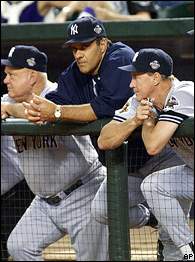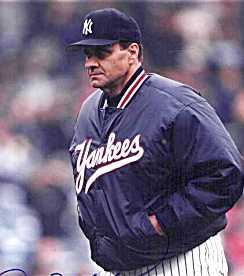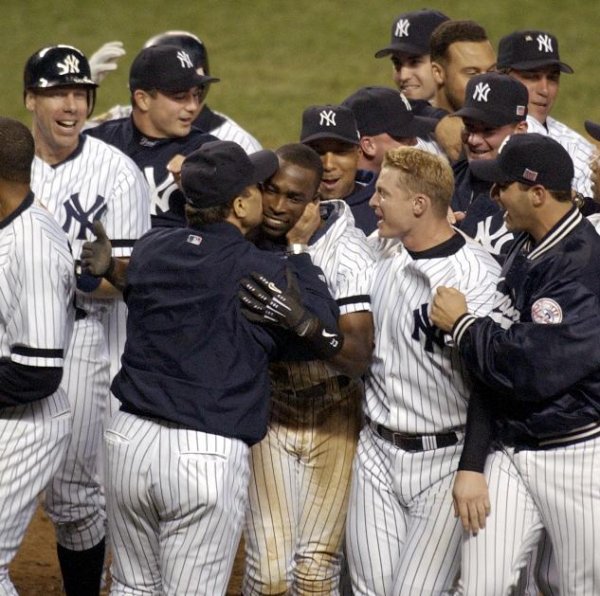|
Joe Torre: A Man for All Seasons
By Maury Allen |
|
Associated Press In the dugout: Don Zimmer, Joe Torre, Mel Stottlemyre.
|
Associated Press Torre's classic trek to the mound. |
|
Associated Press Joe Torre kissing his hero, second baseman Alphonso Soriano, in the Division Championship Series of 2001. |
|
|
By Maury Allen
Joe Torre sat behind a long table in the interview room at Yankee Stadium, The House That Ruth Built, a few minutes after his team registered the Colossal Collapse last month, losing the American League pennant to the hated Boston Red Sox after holding that insurmountable three games to none lead. There was some sweat coming down the side of his face from that thinning hair on top and his Yankee cap with the famed NY logo sat back on his high forehead. The lines in his 64-year-old face seemed deeper and the bags under his eyes indicated a lot more sleepless nights than those of us who just watched all those long games from the comfort of our couches. Torre answered all of the pressing questions with the confidence of a baseball manager who won four World Series in his first eight Yankee seasons and has a 15 million dollar contract over the next three seasons in his back pocket. "We didnít hit when we had to and we didnít pitch like we could," Torre said in his deep melodious voice, once good enough to be a baseball broadcaster in Anaheim for five seasons before returning to the field. He handled all the questions with ease, without any outward signs of disappointment or anger, with the aplomb he has exhibited as a star player and successful baseball manager for almost 45 years. The questioning in the bowels of the Stadium in his ninth season as Yankee field boss and fourth in a row without a championship ring were hardly as intense as the grilling he got in Atlanta in 1977 just 15 days after he was named manager of the Mets. The Franchise was traded away that day from the Mets and Torre had to explain why it happened. It wasnít easy. Tom Seaver, a future Hall of Famer, was the heart of the New York Mets team. A bitter contract dispute in the early days of free agency in baseball put Seaver and Mets boss M. Donald Grant at loggerheads. Grant traded Seaver to Cincinnati rather than pay him market value and Torre was quickly shorn of the best pitcher in the National league as he began his managerial career straight from his third base chores as a player. "The writers really had me pinned up against the wall on that one," he recalled. "The funny part of it was that I had nothing to do with it. When Seaver was traded away I was told about it after it was all done." It was a brutally hot Georgia night. The Atlanta clubhouse was overwhelmed with reporters. The New York sportswriters were antagonistic about losing their favorite star. Torre was the object of their dissatisfaction. "All I could do was answer as honestly as I could," Torre recalled. He handled that emotional scene as well as any manager could. Losing a pennant race with four straight losses and explaining that away seemed easy after the Seaver fiasco. Joseph Paul Torre is used to pressure scenes. That is what his life has been all about. He was born July 18, 1940 in Brooklyn, New York, the fifth child of a New York City police detective and a battered, abused mother. "There were times when I was a kid when I was just afraid to go home if my father was in the house," he said. "I knew there would be a lot of yelling and a lot of fighting." Torre had two older brothers, Rocco, also a police officer and Frank, a future big league ball player and two older sisters who did all they could to protect the familyís baby. "When Frank made it to the big leagues with the Braves in 1956 I would often work out with the team in Ebbets Field," Joe said. "That was always great fun but the Milwaukee players like (Warren) Spahn, (Eddie) Mathews and (Johnny) Logan would really get on me about my weight." Torre was a 235- pound butterball with a chubby face at the age of 16. It didnít stop him from starring on a Brooklyn sandlot team called the Cadets or at St. Francis Prep in Brooklyn. "I played on this one sandlot team in Brooklyn and we made it to the championship game at Ebbets Field. The great Brooklyn star, Pee Wee Reese, was our manager. He knew Frank as an opposing player and when I took the field he yelled over at Frank, ĎHey, your little brother really likes his groceries.í It made me cry but I still didnít lose any weight," Torre said. The Braves signed Torre out of high school at the age of 19 and sent him to Eau Claire, Wisconsin where he batted .344 with 16 homers in 117 games. He was in the big leagues with Milwaukee with future Hall of Famers Spahn and Mathews before the end of that first season. He played 27 games and hit .342 in Louisville and became the backup catcher to Del Crandall before the 1961 season was over. Torre spent the next eight seasons with Milwaukee before being traded to the Cards for future Hall of Famer Orlando Cepeda in March of 1969. Manager Red Schoendienst had a little surprise for Torre before he landed safely in St. Louis. "I want you to play third base for us and I want you to lose 35 pounds," Schoendienst said. "That was the hardest thing I ever did in my life," Torre said. Ball players practice cruel humor. When a player is tall he is called "Shorty." If heís a guy with speaking problems he would be called, "Mumbles," but if he is fat he will always be kidded about being fat. The name the present Yankee skipper bore for many years in his chubby days in Atlanta was "Chicken Catcher Torre," a needle about his background and his avoirdupois. Torre lost the weight with exercise in the off-season and portion control the rest of his days. He is now at 200 pounds almost 35 years after the traumatic weight loss. He starred for the Cardinals with a Most Valuable Player year and a .363 league leading average in 1971. He was traded to his hometown Mets in 1975 and was named the teamís player-manager on May 31, 1977. Torre ended up with a .297 career mark and solid Hall of Fame credentials. What he didnít have on his resume was a World Series title. He managed the Mets for five seasons, moved to Atlanta as the skipper, went into broadcasting in California, came back on the field with St. Louis in 1990 and was fired again in 1995. "Once you are on that managerial wheel you always have a chance to get back into it," he said. A recommendation by Yankee executive Arthur Richman brought Torre to owner George Steinbrennerís attention after Buck Showalter lost the 1995 Division Series to Seattle. Torre had never won anywhere as a manager and the press quickly labeled him, "Clueless Joe." A 1996 World Series win over Atlanta changed all that. It was very traumatic for Torre because his big brother Frank underwent a heart transplant as Torre led the Yankees to the title. He won again in 1998, 1999 and 2000 over the Mets despite a bout with prostate cancer and despite the buttinsky Boss Steinbrenner. The October loss to the Red Sox, as they finally shook off the Curse of the Bambino, was a severe blow. It hardly changed Torreís standing as one of the gameís best managers ever and a certain future Hall of Famer. Torre and his third wife, Alice, now make their home in Westchester County with their daughter, Andrea Rae, a cuddly nine-year-old and enjoy the quiet suburban life in the winter months away from baseball. "I still enjoy the game, I enjoy managing and I think itís more fun than I could get in anything else I might do," said Torre. This kid from Brooklyn, a fan of the New York Giants as a youngster, could hardly imagine he would become a legendary figure in the Bronx. Strange things happen in baseball. Sometimes teams even blow three game leads in a seven game League Championship series. And they live to talk about it.
|
|


